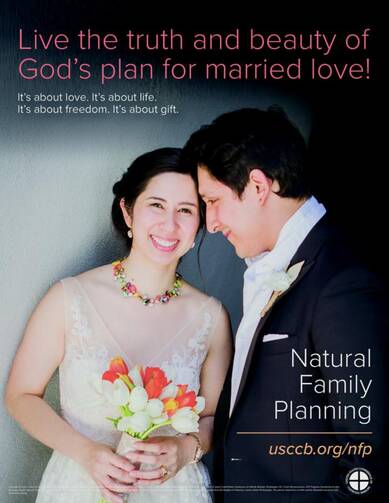WASHINGTON (CNS) -- Natural Family Planning Awareness Week is slated for July 19-25 this year and has as its theme: "Live the truth and beauty of God's plan for married love!"
The weeklong observance is a national educational campaign of the U.S. Conference of Catholic Bishops that celebrates "God's design for married love and the gift of life and to raise awareness of natural family planning methods," said a USCCB news release.
The week annually highlights the July 25 anniversary of St. Paul VI's 1968 encyclical, "Humanae Vitae" ("Of Human Life"), which affirmed Catholic teaching against artificial contraception and provides clear teaching "about God's plan for married love and the transmission of life." The week also includes the July 26 feast of Sts. Joachim and Anne, the parents of the Blessed Mother.
Natural family planning, or NFP, involves the monitoring by a married couple of the various biological signs indicating a woman's time of fertility and infertility. It can be used both to avoid pregnancy or to aid in becoming pregnant.
St. Paul in "Humane Vitae" said the only licit means of regulating birth is natural family planning. In the document he asked scientists to improve natural family planning methods "providing a sufficiently secure basis for a regulation of birth founded on the observance of natural rhythms." In the 50-plus years since the encyclical there has been an explosion of research into methods of natural family planning.
"The church's teaching on contraception is not just a doctrine that states what not to do," said Janet E. Smith, who was a professor of moral theology at the Sacred Heart Major Seminary in Detroit from 2001 until her retirement in 2019. She held the seminary's Father Michael J. McGivney chair of life ethics from 2016-2019.
"Many people would benefit from knowing that it is a doctrine that explains how extraordinarily important is the act of having children," said Smith, who made the comments in an article on natural family planning included in a package of articles, videos, suggested liturgies and prayers, church teaching, NFP resources, and other features available on the USCCB website at https://bit.ly/2BFCQfd.
The USCCB's Natural Family Planning Program is part of its Secretariat for Laity, Marriage, Family Life and Youth.
"Those who understand the church's teaching on sexuality know that to a great extent it is shaped by a concern for the well-being of any children who may result from acts of sexual intercourse," Smith said. "Children born into families where their parents are sexually self-controlled, where they are faithful, stable, and desirous of children are predictably much better off than those born to single parents, to the unfaithful, to those open to divorce or divorced."
Sixth-eight percent of children born in the U.S. are born out of wedlock or born into households "that will fragment through divorce," she said. "One out of four pregnancies is aborted." These realities are the result of "our sexually out-of-control culture and divorce culture," she added.
Church teaching on contraception also is "shaped by a knowledge that those who become parents generally become much better people; they need to develop quite a set of virtues in order to be good parents. Those virtues also help them be good spouses, good co-workers, good citizens," said Smith, who speaks nationally and internationally on Catholic teaching on sexuality and on bioethics. She has published numerous articles on sexuality and bioethics.
"Those who use natural family planning to plan their family size develop the virtues needed to be good parents; they develop sexual self-control and patience and generosity -- and they almost never divorce," according to Smith.
The USCCB materials for Natural Family Planning Awareness Week include stories from couples, like Jennifer and John Campbell, about the role of natural family planning plays in their marriage.
"For a newly engaged couple, learning natural family planning is informative, interesting, at times a little embarrassing, but always enlightening. Living NFP, on the other hand, is a different story," the Campbells wrote. "It is a story about connections, very unique and fulfilling. It involves the use of information learned which we then apply to the reality of everyday married life."
"At the beginning of our married life, we used NFP to avoid pregnancy, as the time was not right for it," they said. "Currently, we are using NFP to achieve pregnancy. We were delighted to find that the two focuses of NFP have made our young marriage both more focused and more intimate."
They added: "Unlike artificial contraception, which usually places full burden of family planning on the woman, NFP promotes shared responsibility of the fertility of both the husband and wife. It lends a spirit of togetherness to a marriage."
They acknowledged that natural family planning "can be a challenge and a sacrifice at times."
"We're not saying it's always easy, but that is part of true love, a bit of sacrifice for the beloved," the Campbells said. "We find a noble joy in sacrificing ourselves for each other, even in so private a way as withholding intimacy until the time is right; self-sacrifice is an important root element of love, and it builds respect for each other and ourselves."










